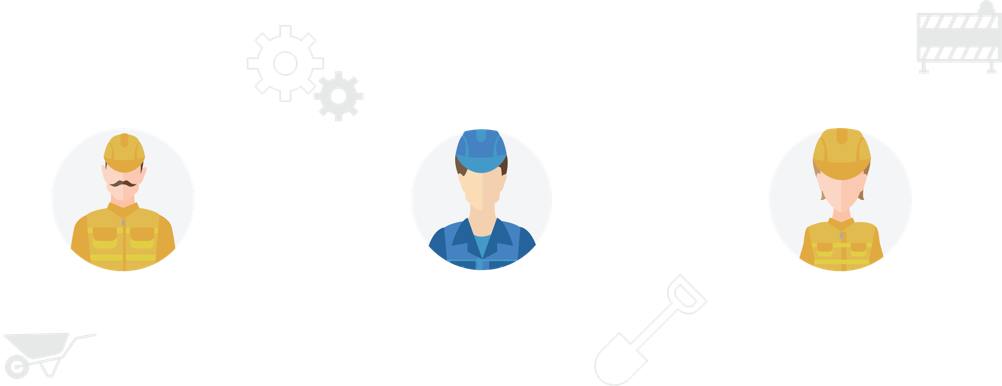Plumbers install, repair, and maintain pipes, fixtures, and other plumbing equipment used for water distribution, drainage, and waste disposal in new or existing residential, commercial, and industrial buildings.
Job Related Skills, Interests and Values
- Reading blueprints, drawings, and specifications to determine layout of plumbing systems, water supply networks, and waste and drainage systems
- Installing, repairing, and maintaining domestic, commercial, and industrial plumbing systems
- Locating and marking positions for pipe connections, passage holes, and fixtures in walls and floors
- Measuring, cutting, bending, and threading pipes using hand and power tools or machines
- Testing pipes for leaks using air and water pressure gauges
- Communicating effectively with co-workers, contractors, and other tradespeople
- Planning and performing complex calculations for specialized projects; costing and estimating the work to be performed
What Preparation and Training Do You Need?
- Grade 10 is the legal minimum, though a high school diploma is generally required
- Completion of 9,000-hour apprenticeship, including on-the-job and in-school training
- Exam to obtain Certificate of Qualification
What's Your Future as a Plumber (306A)?
- Varied workplaces include construction sites, factory floors, and residential buildings
- Technology increasingly important for drawing, estimating, and cost reporting, as well as use of integrated plumbing systems
- Many plumbers are self-employed, but some are hired by plumbing and heating/air conditioning construction firms
Wage Rate
Apprentice wage increases with skill and experience. Fully qualified workers earn an average of $33.00-$45.00 per hour.
Self-Rating
Plumber (306A)
| Ask Yourself: | Yes | No |
|---|---|---|
| Can you read and interpret blueprints and diagrams? | ||
| Do you enjoy problem solving and coming up with a solution? | ||
| Do you have good communication, verbal, and writing skills? | ||
| Are you able to follow Health & Safety guidelines? | ||
| Are you able to lift more than 50lbs? Are you able to stand or sit for long periods of time? | ||
| Are you willing to travel for work? | ||
| Are you reliable, a self-starter and able to work with minimal supervision? Are you a team player? |
If you checked YES to the majority of these questions, a career as a Plumber (306A) may be for you!
You might want to look at these similar trades as well;
- Bricklayer
- Carpenter
- Boilermaker
Construction Boilermakers build, repair, test, and maintain all types of boilers, tanks, and pressure vessels. They also perform all types of structural and plate work on dust, air, gas, steam, oil, water, and other liquid-tight pressure vessels. Work may occasionally be done on scaffolds to repair and maintain existing boilers.
Pressure systems welders use shielded metal arc welding, gas metal arc welding, gas tungsten arc welding and flux cored arc welding processes to weld metal plates, tubes, and other structures in boilers and other pressure systems. They cut pipes and tanks and assemble these pieces, and may have to repair defective welds in boilers and pressure systems.
Brick & Stone Masons prepare and lay bricks, concrete blocks, stone, and other masonry units to construct/repair structures like walls, patios, arches, fireplaces, and chimneys. They may also lay materials used in the construction of industrial furnaces, retorts, and boilers.
Water Well Drillers operate various types of drilling equipment for the purpose of drilling and servicing water wells. They are required to perform service and maintenance of drilling equipment, select and change drilling tools, complete bore holes into a productive well, and disinfect and service completed wells and pumping equipment.
A Native Residential Construction Worker may work in any aspect of constructing a First Nations home, from excavating to finishing electrical or carpentry. They are trained in carpentry, electrical, and plumbing.
General Carpenters work mainly with wood, wood substitutes, and materials like drywall, plaster, steel, copper, and tiles. They may construct, install, maintain, or repair structures and be responsible for framing and forming or finishing cabinets, doors, stairs, and other major wooden structures.
Sprinkler System and Fire Protection Installers fabricate, install, test, maintain, and repair water, foam, carbon dioxide, and dry chemical sprinkler systems in buildings for fire protection purposes.
Steamfitter/Pipefitters lay out, assemble, fabricate, maintain, and repair piping systems carrying water, steam, chemicals, and fuel through heating, cooling, and lubricating systems.
Construction Craft Workers prepare, excavate, backfill, compact, and clean up work sites. They also handle materials, as well as ship and receive parts.
